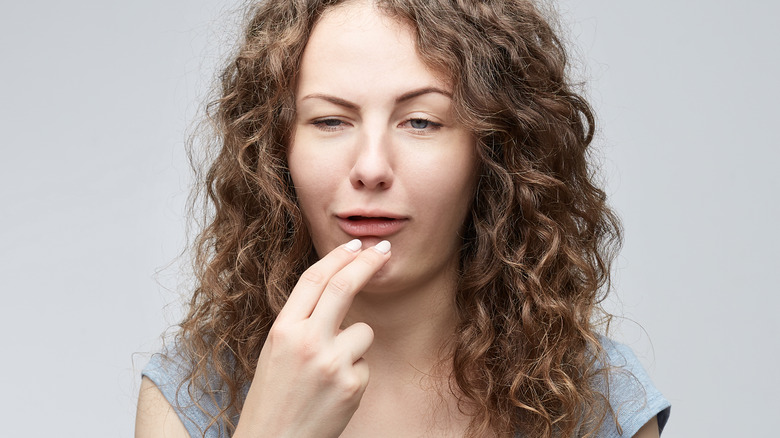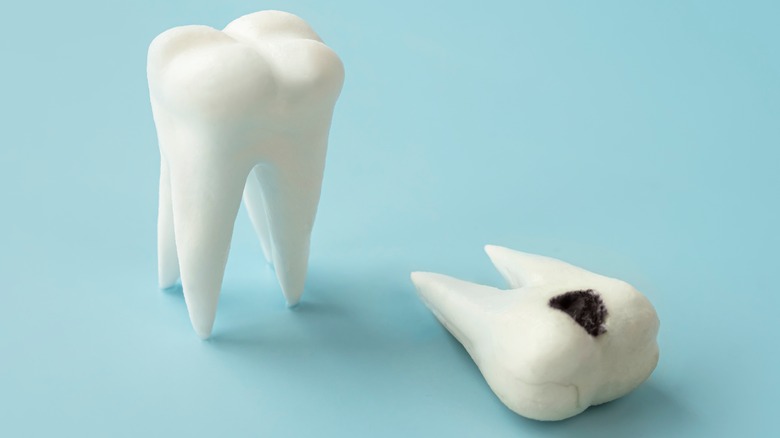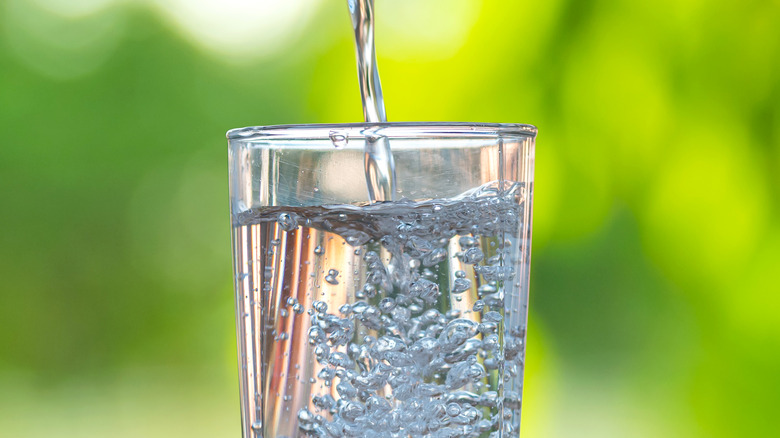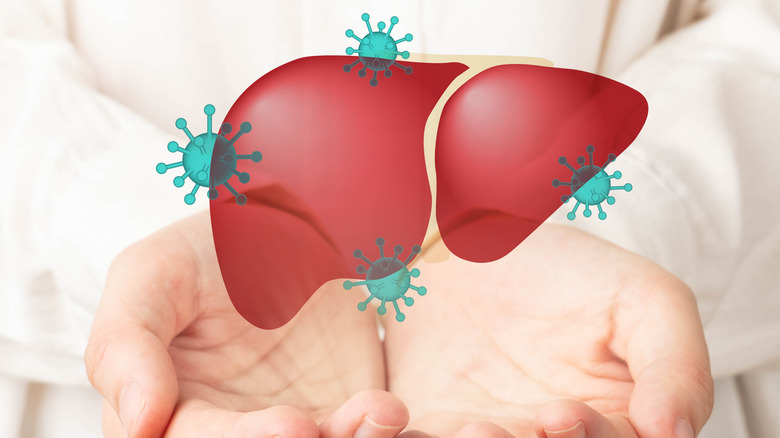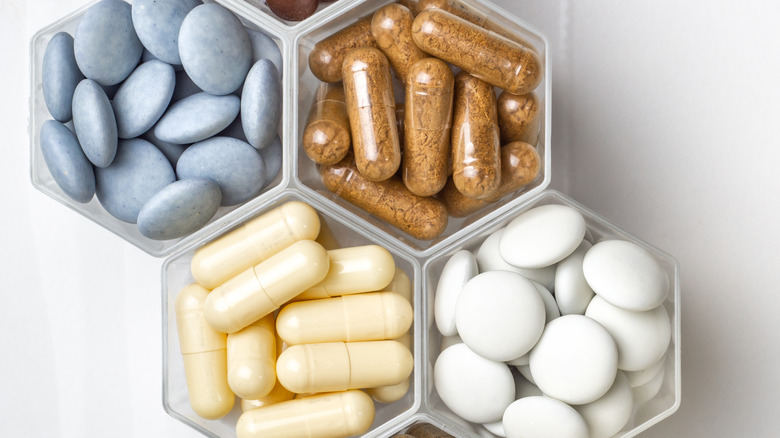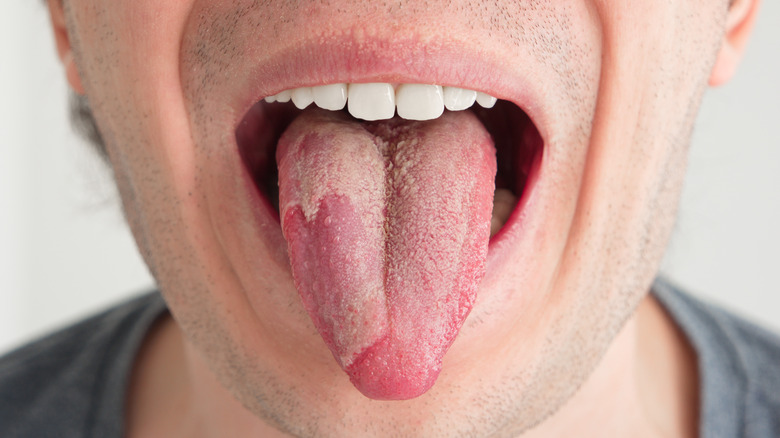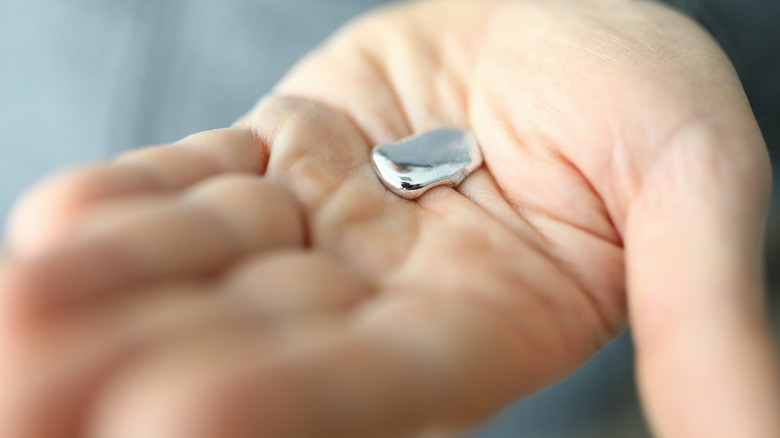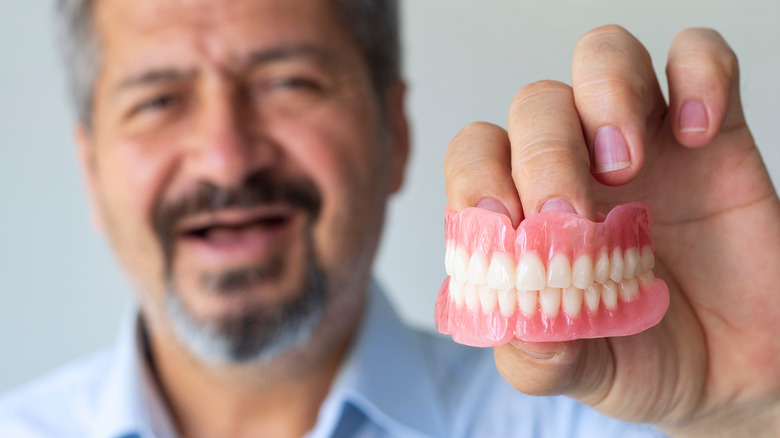When A Bad Taste In Your Mouth May Be More Serious Than What You Ate
How often do you taste your own mouth? Think about it, folks: We spend all day with our taste buds nestled between our jaws, swallowing unconsciously from sun up to sun down (and while we're sleeping, too), and yet, most of the time, we only really notice taste when we're eating or drinking. But now and again, tastes can sneak up on us, for seemingly no reason. And while we can assume it's just lingering from the last thing that passed our lips, it may be something else entirely.
Dysgeusia, the medical name for a strange or bad taste in the mouth (per MedicineNet), can be pretty surprising, pretty concerning for some folks, and sometimes, pretty serious. And so, if you're experiencing dysgeusia, it's useful to consider exactly why your taste has changed. Luckily, we've been looking into this mysterious condition and put together a list of all the reasons why your taste buds might seem a little more active than usual. Let's take a look at what could be causing that bad taste.
A bad taste in your mouth could be a sign that your hormones are changing
Our mouths are, in many ways, the portal to our bodies. Not only do they provide the entryway for all of our sustenance to enter, but they also provide a window into our bodily stasis, with our tongue telling us everything from our vitamin balance to the presence of chronic conditions (per the Cleveland Clinic). And a change in taste can tell us more things about our hormone levels than we think.
When people go through menopause, for example, the shift in estrogen in the body can cause an easing in saliva production, states My Menopause Centre. When saliva levels reduce and the mouth dries out, this can result in a strange taste, and may also affect the person's sense of smell. The fluctuations of hormones that occur when people are pregnant may also provoke a change in taste, as a study published in Chemical Senses shows.
If you're going through menopause, it can be useful to introduce a few changes to your lifestyle to minimize the bad tastes you might experience. Drinking more water to keep your mouth moist, chewing gum to stimulate saliva production, and reducing dehydrating elements like alcohol and caffeine may all help.
If you have a bitter taste, it could be due to your stomach
Given the clear and direct link between our mouths and our stomachs, it's perhaps little surprise that when we taste something funny without warning, it could be coming from our belly. And a particularly bitter taste in the mouth might be the result of one of the most common gastrointestinal conditions there is: acid reflux (per Medical News Today). When you have acid reflux, your stomach acid can work its way up towards your throat and mouth through a weakened sphincter that separates your stomach from your esophagus. It's this acid, or bile, which makes things taste a little off.
While acid reflux and gastroesophageal reflux disease (GERD) are both experienced by millions of people around the world, that doesn't mean they're not a cause for concern. GERD, in particular, can cause pain in your chest and upper abdominal region, and if you have GERD in the long term, it can lead to a host of complications, like esophageal ulcers or even lung problems (per WebMD). GERD and acid reflux can be managed using medication, but in more severe cases, surgery may be required.
Your dental hygiene could be causing your bad taste
Most of us know the paramount importance of maintaining proper dental hygiene, but let's be real: Even the most committed tooth-brushers out there still might not be as thorough as they'd like from time to time. But if you're experiencing a bad taste in the mouth, it might be worth thinking a little harder about your dental routine, as issues with your teeth and gums might be the cause (per Dental Excellence of Blue Bell).
Gum disease can prompt bad tastes in the mouth — and what's more, it can be easy to miss in its early stages. Check for receding gums (which may be indicated by one of your teeth looking like it's longer) or redness around the area. Tooth decay can also be a direct cause of bad taste, as well as bad breath, thanks to the sulfur-producing bacteria that attach themselves to your teeth and eat through them. You may also be storing bacteria on the surface of your tongue, which can lead to an unpleasant taste.
Luckily, a solution to these things is to take preventative measures by adopting a robust dental hygiene routine. You can also address this problem by brushing and flossing regularly (and making sure to brush your tongue, too).
You may have a dry mouth (or something a bit more complicated)
As a part of the body that's producing moisture 24/7 through saliva production, it's amazing how quickly the mouth can dry out. But it is indeed the case that our oral cavity can become parched quickly, and when dry mouth (or xerostomia, to give it its proper medical term) occurs, it could be indicated by a bad taste (per Healthline).
"But surely," we hear you cry, "if I have a dry mouth, I would just need to drink some more water, right?" Not quite. Xerostomia might not be a huge hassle to experience (besides being a little unpleasant), but it could also be a sign of something far more serious. Aside from being a sign of dehydration or stress and anxiety, dry mouth may also be caused by diabetes, nerve damage, or even cystic fibrosis. Xerostomia can also be a symptom of certain autoimmune disorders, or even neurologic disorders like Alzheimer's disease.
If you're concerned about your dry mouth and rehydrating doesn't address the issue, it's wise to speak to your doctor.
A bad taste in the mouth could be a symptom of hepatitis
While some causes of a bad taste in the mouth might be fairly innocuous, others present way more cause for concern. And that's why it might be useful to know that hepatitis B could be behind your strange taste, and if it is, you should seek medical attention immediately (per Medical News Today).
A liver infection caused by a virus, hepatitis B is a hugely common — and hugely dangerous — condition, with almost 300 million people living with the condition worldwide in 2019, and over 800,000 deaths caused by hepatitis B in the same year (per the World Health Organization). The infection can be spread through contact with needles or other instruments that have been exposed to the virus, as well as to babies before birth and from child to child. In addition to having a bad taste in your mouth, symptoms of hepatitis B include fever, diarrhea, nausea, and vomiting. Luckily, vaccines for hepatitis B are widespread. If it is contracted, chronic hepatitis B can be treated using medication — which is highly advisable, as the condition can lead to further complications.
You might have an infection
Is the bad taste in your mouth accompanied by you feeling a little worse for wear? Well, folks, if it is, it might be being caused by a regular old infection.
Viral infections that affect you above the neck are especially prone to provoke a bad taste in the mouth, and colds and middle ear infections might have things tasting a little funny, as well as causing a change in smell (per Healthline). But bacterial infections can also prompt a different mouth taste, with it being a common symptom of strep throat, along with a potential change in appetite, says Penn Medicine.
So why exactly does our taste change when we're infected with something? Apparently, it's largely due to our protein levels when we're not feeling our best, according to a study published in Brain, Behavior, and Immunity. Researchers proposed that when we're ill, we have different levels of the TNF-α protein, a protein that manages inflammation, and this can have an impact on how we perceive and experience tastes. Pretty interesting, huh?
Any vitamins or supplements you're taking might alter your sense of taste
If you're a fan of vitamins and supplements, you're not alone. People across the world spent almost 152 billion dollars on dietary supplements in 2021, according to Grand View Research, and the practice of throwing down a multivitamin and a few extra pills with your breakfast is commonplace for millions of people across the country. But those supplements could be a surprising cause of that bad taste in your mouth, according to Healthline. Specifically, vitamin and mineral tablets tend to produce a slightly metallic taste, and the more you take, the stronger it can be.
And if you're wondering which supplements cause that taste, it's wise to start with the minerals. Metals like chromium, copper, zinc, calcium, and iron — all essential minerals that we need in our bodies in certain quantities — tend to make your mouth taste a little different. This may also be the case if your multivitamin contains these minerals in higher quantities. And on the vitamin side, vitamin D supplements may also cause a bad taste.
If you suspect that your supplement plan might be causing your taste change, try eliminating them from your routine and see if there's any difference.
If you're undergoing cancer treatment, your taste may change as a result
While changes in taste or differing tastes in your mouth can often be a symptom of an underlying condition, they can also be caused by the treatment for the condition itself.
Cancer treatments are one such example of this, with both chemotherapy and radiotherapy potentially prompting a different taste in your mouth. For people getting chemotherapy, changes to their taste are very common, with around half of all patients noting a difference, potentially due to the change in mouth cells that the treatment provokes (per Chemocare). A wide range of chemotherapy medicines can cause taste changes, with biologic therapies also producing new taste sensations. These can last for anywhere from a few hours to several months after treatment.
Radiotherapy may also prompt a different taste in your mouth, especially if you're receiving treatment around the oral area, says Cancer Research UK. Mouth radiotherapy, as well as radiotherapy to the neck and head, may alter your salivary glands and your ability to produce saliva, which may result in a dry mouth and an unpleasant taste. Although this taste can fade over time, in some people, the changes to the mouth caused by radiotherapy may be longer-lasting.
Your mouth taste may alter thanks to the medication you're taking
These days, there's a medication for pretty much anything that ails you, from allergies to infections to chronic underlying conditions. And while we'll never stop praising the wonders of modern medicine and its improvements to the lives of countless people, it's also useful to point out that the medication you're taking might be having some subtle, but notable side effects, including a bad taste in your mouth.
A huge range of medications can prompt an unpleasant mouth taste, with antibiotics, antihistamines, diabetes and cardiac medications, and oral contraceptives all potentially contributing, according to Medical News Today. Anti-inflammatory medicines and treatments for conditions like gout and HIV could also be the cause of that bad taste.
And while some medications result in a taste that's slightly metallic or sour, others can cause something which causes a bad taste. Some meds (like antidepressants, medicines for neurologic conditions, and seizure medications) can reduce your saliva production, causing dry mouth, says WebMD. And the drier your mouth is, the harder of a time it has washing the bacteria that collects there away, resulting in an unpleasant taste.
You might have oral thrush
Infections of all kinds can result in you having a bad taste in your mouth, and fungal infections are no different. Oral thrush, which is caused when the Candida fungus that lives in the mouth starts to grow in number, can create a pretty undesirable mouth taste, as well as a range of other unpleasant symptoms (per NHS Inform). Your change (and sometimes loss) in taste could also be accompanied by mouth pain, redness or cracks around and inside your mouth, and telltale white patches that form in your oral cavity, which may produce blood once wiped away.
Luckily, oral thrush isn't difficult to treat, and it can't be passed from person to person. Your doctor will normally prescribe an antifungal medicine, which may be either topical or taken orally. A robust dental hygiene program will reduce your chances of developing oral thrush enormously, as well as quitting smoking (if you do so). But while oral thrush can be cleared up easily with assistance from a doctor, it's important to do so quickly — the longer you leave it, the more likely it is to spread to other areas of your body and create further issues.
If you have certain neurological conditions, it might make the taste in your mouth change
The link between our brains and our bodies is hugely complex and multifaceted. And when it comes to neurological conditions, our bodies can be affected in a range of ways, with some of them more surprising than others. Taste, and taste changes, can be a symptom of several neurological conditions, according to a report published in BMC Neurology. Parkinson's disease and amyotrophic lateral sclerosis (ALS), a nervous system condition that can affect our muscle control (per the Mayo Clinic), can both result in different taste sensations.
Importantly, too, a change in taste may be an early indicator of neurological conditions. The BMC Neurology report examined the case of a middle-aged man who developed a "taste disturbance," which wasn't altered by any changes to his lifestyle or supplement regimen. Several years later, the man developed further symptoms and was diagnosed with facial onset sensory and motor neuropathy (FOSMN), an uncommon motor neuron disorder that can lead to a reduction in motor function (per the Genetics and Rare Diseases Information Center).
A bitter taste can be caused by chemical exposure
A change in mouth taste can be subtle, and it can also be easy to ignore it or write it off. But if you notice an especially metallic taste in your mouth, it's important to be aware of where it might be coming from, as one of the causes could be dangerous chemical or metal exposure (per WebMD).
Lead poisoning may be indicated by a metallic taste. Frustratingly, it can come from a huge number of places, including water or soil, old toys or jewelry, and paint around the house. This is especially common in older houses built pre-1978, says the CDC.
Mercury exposure may also provoke a metallic taste, and can be extremely dangerous. Mercury poisoning can come from anywhere, from exposure to a broken thermometer to eating too much fish with higher levels of the metal (via the United States Environmental Protection Agency). Both mercury and lead poisoning should be addressed immediately, as the consequences can be severe. Specifically, mercury poisoning can lead to numbness, nausea or vomiting, loss of memory, and even seizures, says the Cleveland Clinic.
Having a dental prosthesis fitted can alter your taste buds
For many people, having a dental prosthesis fitted can supply a new lease of life, with dentures supplying the ability to eat and drink normally. But one surprising consequence of getting dentures is that sometimes, they can make your experience of eating less pleasurable, thanks to their potential impact on taste (per Denture Healthcare).
This is especially the case if you're having a full set of upper dentures fitted. When the dentures are inserted, the base plate that they're attached to can cover the taste buds that sit on the roof of the mouth (yep, that's right, folks — we have taste buds up there, too). This can alter your ability to taste, and may leave foods tasting slightly different, although it should return to normal as your other taste buds adapt.
Elsewhere, improper fitting of dentures can leave you with a pretty funny taste, and likely a trip back to the dentist, on your hands. When dentures are applied with too much adhesive or cream, this can leave you with a lingering metallic sensation that doesn't dissipate as quickly as it should.
How can you treat the bad taste in your mouth?
For a fairly simple symptom, treating a bad taste in the mouth can be surprisingly difficult to do, and this is largely because it's often caused by something else entirely. As such, treatment for an unpleasant taste usually involves addressing the underlying cause, as Medical News Today states.
If your bad taste is being prompted by a dental issue (like gum disease or an oral cavity), your dentist might conduct a procedure to fix the problem or prescribe you a treatment plan to follow. Following oral hygiene will also help to reduce the bad taste, and limit the chance of it recurring.
In other situations, however, your bad taste might not be able to be treated at all — and sometimes, it doesn't need to be. It's important to remember that unpleasant tastes as a byproduct of conditions like viral infections will clear themselves up as your body rids itself of the invading microbes. If your bad taste is prompted by a hormonal change, you may just have to ride it out. All the more excuse to eat something delicious to replace it, in our opinion!


